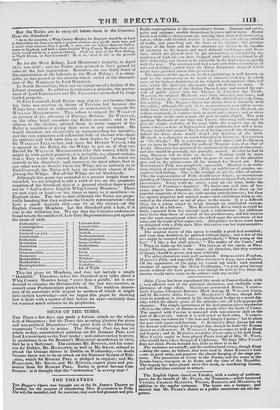THE THEATRES.
TnE Beggar's Opera was brought out at the St. James's Theatre on Tuesday, for the purpose of introducing Miss RAINFORTH in Polly. The wit, the moralist, and he musician, may each find pleasant and pro. fitable contemplation in this extraordinary drama. humour and satire, point and epigram, sparkle throughout in prose and in verse. Brutal mirth and reckless desperation are running their short nod intoxicatirig. career, while cold-blooded avarice is making vice and vAlsny articles of traffic, and parcelling out the lives of its rietims: the genuine virtues of the heart and its best emotions are shown to be capabk of existence in the lowest and most debased conditions ; and those vice: which are glossed over by the phraseology or defended by the sophistry of high life, are here stripped stark naked—exhibited In all their deformity, and shown to be attainable by the highwayman equally with the peer. The musician will find a rare and choice assemblage or national melodies—culled from the Three Kingdoms, Many of which might have perished unless thus preserved. The success of this opera, On its first production, is well known, as well as the controversy on its moral or immoral tendency, in ss bleb some of the highest dignitaries of the Church took opposite sides, and into which Dr. JOHNSON afterwards did not disdain to enter. It emptied the benches of the Italian Opera.hause, and turned the cur- rent of public favour into the Theatre in Lincoln's Inn Fields. Waisssu, the original Michela /I, rose from obscurity into fame ; and Miss FENT0N, by her reprvsennaion of Polly, obtsined not only fame, but nobility. The Beygar's Opera has always been a favourite with the public ; although the style of its representation now differs essen- tially from what it originally was. Tile ingredieets for us 3lauler:1h are seldom combined—it requires both an actor and a singer ; and as these seldom unite in the same person, the part is rarely played. The only speaking Macheath of our time was l'ous:n, who stung well enough to give the simple melodies of his pant, while the Captain was in his howls a herc—a hero of highwaymen and cutthroats, ha still a hero. No one would ever suspect Haanam of having earned this elevation— indeed his dress alone would dispel any delusion of the kind. Maeheath is a character as much belonging to history as ALEXANDER or "the Swede." He is a personage of past time ; and his likeness Can no more be found within the walls of Newgate now, than that of Lot/cit. HoGmern has preserved the costume of the original characters; and this should be generally, not partially, copied. In what he had to sing, BRAIIAM left us little to desire. Nothing could be more finished than the expression which he gave to some of the plaintive airs, and in the prison-scene all his wonted fire blazed out. Miss RAINFORTICS Polly was completely successful. Mandane is an ambi- tious display of power and agility—Polly an exhibition of genuine, un- sophisticated feeling. Onc is the triumph of art, the other of nature. This the representative of Polly should never forget; no ostentatious parading of Opera-house passages should make us forget Polly in her re- presentative. Every wonh she utters, every air she sings, befits the character of Peachum's daughter. We know very well that, of late years, singers have forgotten this, and endeavoured to dress up the graceful simplicity of these airs with tawdry embellishments; but they err against propriety and musical taste—such exhibitions being as un- suited to the character as out of place in the music. It is a difficult. thing for a young singer to break through an established custom, although it be a bad one. Miss RAINFORTH did as much as could be fairly expected from her towards such a reformation : her additions were fewer than those of several of her predecessors, and her success was the most unequivocal where she relied upon the sweetness of her voice and the truth of her expression. Altogether, we have never been so delighted with a Polly since Miss STEPHENS was her representative.. We make no exception. - The original music of this opera is usually a good deal curtailed ; and some may, doubtless, be omitted without injury : but a few of the airs might be restored with effect,—particularly, " When young at the bar," " I like a fox shall grieve," " The modes of the Court," and " When he holds up his hand." The interest of the opera, at BRA- HAM'S Theatre, centres in the songs : all, therefore, that they contain of beauty should be given, and none withheld.
The other characters were well sustained. STRICKLAND'S Peachum, HARLEY'S Filch, and especially Miss STANLEY'S Lucy, were excellent. Of the appearance of the gang, we cannot say much : each seemed emulous of appearing like Harry Paddington, " a poor petty larceny rascal, without the least genius, who though he were to live these Six months would never come to the gallows with any credit."


























 Previous page
Previous page